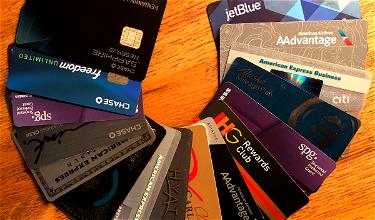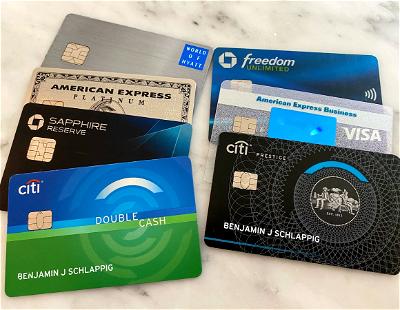Over the past six months the four biggest payment processors in the US — American Express, Discover, Mastercard, and Visa — announced that they’d be discontinuing signature requirements on credit card purchases under select circumstances. Mastercard was the first payment network to make this announcement, and then for competitive reasons their three biggest rivals matched within months.
All four companies announced that they’d eliminate the signature requirement as of April, though an exact date wasn’t given at the time. The Verge reports that American Express, Discover, and Mastercard will be eliminating signature requirements as of tomorrow (April 13), while Visa will eliminate signature requirements as of later this month.
The exact regions where the signature requirement is being eliminated varies by company:
- American Express is eliminating the signature requirement globally
- Mastercard is eliminating the signature requirement in the US and Canada
- Discover & Visa are eliminating the signature requirement in North America
Why you still may have to sign for your purchases
While the requirement is formally being ended tomorrow for three of the four payment companies, that doesn’t mean you’ll no longer need to sign. Merchants still have the option of whether or not they want to collect this information — some will stop requiring signatures right away, others will stop requiring signatures in several days or weeks, and others have no plans to eliminate the requirement.
Isn’t this bad news for credit card security?
No, not really.
First it makes sense to understand why credit card companies are making this change. They want to speed up the check-out process as much as possible, in hopes of you putting their card at the top of the wallet. At least I assume that’s what the logic was when Mastercard first announced this, though they lost that edge when all of their major competitors matched their policy.
The reason this doesn’t have any impact on security is because in practice credit card companies didn’t actually use signatures to authenticate purchase. You could literally scribble anything and your purchase would be approved, so really the whole signature requirement was more of a security theater than anything else.
This is good news, but…
I’m a big fan of this development, as it will make the check-out process quicker. However, what confuses me is that card these companies aren’t taking the chance to finally update their technology and implement Chip & PIN technology in the US, which is much securer. It’s bizarre to me how the US is the largest market in the world for credit cards, yet we also have some of the worst credit card security. Wouldn’t this be the ideal time to finally make this update?
I’m out of the US at the moment, though if you’re in an eligible market and use a credit card starting tomorrow, please report back on whether you’re asked to sign!





Wow, you people don't realize why the US doesn't have chip+pin: there is no reason to. In the US< the cardholder is not liable for fraud, so why should they be asked to remember a PIN?
Then, most US cardholders have a few cards, so the first card with a PIN is the first one they stop using because they forgot the PIN.
Fraud detection is pretty advanced and the card issuer is ready to...
Wow, you people don't realize why the US doesn't have chip+pin: there is no reason to. In the US< the cardholder is not liable for fraud, so why should they be asked to remember a PIN?
Then, most US cardholders have a few cards, so the first card with a PIN is the first one they stop using because they forgot the PIN.
Fraud detection is pretty advanced and the card issuer is ready to absorb the losses from fraud.
It's not backward -- it's an educated business decision.
@FrequentFlyer thank you for that. Oh my gosh. Yes, you are right. It is much easier to dispute fraud with US banks/credit cards. This is probably why I would never want a foreign issued credit card even if I can. And yeah, the foreign exchange rates....
@Santastico: The next innovation in Europe already exist and it's called contactless. It was virtually nonexistent a couple of years ago, but now basically everyone has it, and also a lot of places that didn't accept credit cards previously.
@Lis: That is because in Australia (and must other places outside the US), transactions where the customer signs are so rare that people would follow the formal procedure, which is comparing signatures, instead of just treating...
@Santastico: The next innovation in Europe already exist and it's called contactless. It was virtually nonexistent a couple of years ago, but now basically everyone has it, and also a lot of places that didn't accept credit cards previously.
@Lis: That is because in Australia (and must other places outside the US), transactions where the customer signs are so rare that people would follow the formal procedure, which is comparing signatures, instead of just treating it as a routine transaction without bothering.
Visa and MasterCard aren't issuers, and American Express in this context isn't either - those three parties provide what are known as payment scheme networks.
@Stanley
I agree. That's why I still have my US credit cards although I have moved overseas more than 10 years ago. I like to use them for purchases on US online merchants as the risk of fraud is higher plus there's no need for me to pay the 3% FX charge unlike using my credit cards that are issued in other countries. That being said, it's also much easier to file and resolve any dispute charges with my US card issuers.
@Tmart:
hilarious that you even missed a second blunder in your own post (chances?). ;-)
Recently in Australia I twice had merchants compare my signature to my Amex card. They were both minor purchases, under $50, and it is the only time that this has happened in years.
From what I saw most people used the tap feature.
Schar, chip & pin should be mainstream. C&P would also eliminate all the people that file fraudulent chargebacks.
It may impact the Statute of Limitations to collect from a non-paying debtor from 6 years in some states to 4 years because the debt will not be based upon a written contract. At least that is a legal argument in Utah.
So if a store/restaurant asks for my signature starting tomorrow, am I allowed to say no?
Brazil has been using Chip + Pin for a while now, crazy to see how the US is so behind from the rest of the world.
To those who present to know: in America, it is still the best for credit card consumers. They offer and honor zero percent liability for fraud and more. I never had to pay for fraudulent charges or even for good or services I never received. No hassle unless it is with Discover card. Yet, who still uses it? Not that many people and it is just for the US market. Never seen it elsewhere.
...To those who present to know: in America, it is still the best for credit card consumers. They offer and honor zero percent liability for fraud and more. I never had to pay for fraudulent charges or even for good or services I never received. No hassle unless it is with Discover card. Yet, who still uses it? Not that many people and it is just for the US market. Never seen it elsewhere.
CHIP+PIN are more prevalent in non-US markets for good reasons. They are much more secured and I do think that they are still convenient to use. Yet, a lot of non-US market and possibly non-Western countries do not have such policy as with the zero fraud liability. I am sure there are other policies in place for those consumers in non-US markets, but it is still a hassle. I know from others in other countries, the banks do not care and if your credit card is fraudulently used or your bank account is hacked, they will still hold you liable. OH MY!! Go US cards especially AMEX and Chase issued. Most convenient and reliable.
Curious to see how this will work at restaurants. I guess we’ll just write in the tip?
There goes “I’d like to sign the check please”. .
The US hasn't switched to chip & PIN because banks are deathly afraid of losing "top of wallet" status. They worry that the added step of entering a PIN would be inconvenient enough for their cardholder to switch to another credit card and never come back. The US consumer banks won't switch chip & PIN unless the card networks or government mandates it.
While chip and pin makes sense, pretty weird to drop any security at all, which signatures provided.
Though it sounds like some retail staff weren't checking, which is also a failing. Though getting rid of security entirely and replaces with a complete failing is no solution to a partial failing.
Ya chip and pin in canada has been over a decade. Pay Wave (tap&go) is even faster. Great for drive though lines. Or as Lucky has pointed out on many aircraft; the mysterious "mobile payment device" lol
Chip + PIN is good but I fear the blame for fraud will be shifted to the consumer. Still, I like Chip + PIN and have one such card. Unfortunately, it's a lousy Canadian card. I only use it in Canada so that they won't think I am a foreigner (American). A lot of Canadians don't like Americans but hide it. Americans don't know it, generally.
Oh how embarrising for me to drop the "a"!
Think Lucky needs some sleep. Amzing how a finger slip chances "plans" to "planes", and spellcheck says OK.
To add to that Canadians have been using chip and pin cards for years. I'm surprised the cards didn't force the issue in the US to save bundles of cash for everyone except those who defraud everyone. Nice to know the change is coming soon. We Canadians like to use our cards in the US too
I’m not sure why merchants would need a plane to eliminate the signature..but ok.
I'm glad to see the U.S. starting to catch-up with not only Europe but also Canada. Here in Canada we have been using the chip & PIN system for years. We also have used the tap & go system for several years for smaller purchases (usually up to $100 or $200). One of the main reasons for the U.S. being behind on these more modern systems is the huge number of banks and banking systems...
I'm glad to see the U.S. starting to catch-up with not only Europe but also Canada. Here in Canada we have been using the chip & PIN system for years. We also have used the tap & go system for several years for smaller purchases (usually up to $100 or $200). One of the main reasons for the U.S. being behind on these more modern systems is the huge number of banks and banking systems that need to be coordinated in the U.S. to have these processes work.
We're glad to see you joining us!
@Santastico you could assign everyone a random pin for each card they have to learn, Americans won't learn it. Let them pick their own PIN and everyone uses the same PIN. Get a data dump from IHG and now you have everyone's credit card PINs.
@Gary Leff: Comparing credit card PIN technology with the stupid 4 digit PIN used by IHG is like comparing apples and oranges. I know it is not impossible but on the credit card someone needs to clone the physical card and have the PIN to use it while to hack the IHG account you don’t need a card to insert in any machine (BTW my IHG account was hacked and they blamed I had a...
@Gary Leff: Comparing credit card PIN technology with the stupid 4 digit PIN used by IHG is like comparing apples and oranges. I know it is not impossible but on the credit card someone needs to clone the physical card and have the PIN to use it while to hack the IHG account you don’t need a card to insert in any machine (BTW my IHG account was hacked and they blamed I had a weak PIN). I have friends and family leaving in developing countries and they have credit cards with chip+PIN for several years and never had a card cloned while I had my cards cloned 6 times in the US. Go figure.
Signatures didn't provide real security. There's a convenience-security tradeoff with PINs that the card companies viewed as not worth making in the US market. PINs are already old technology. Do you feel like your IHG Rewards Club account is secure because of a PIN? They're looking now at biometrics which have their own tradeoffs...
I've written "I do not authorize this transaction" in place of a signature. But that hasn't gotten me anywhere.
We are SO behind Europe, as many of the responses have pointed out. Chip + pin is the way to go. What ever happened to putting your photo on a credit card? Years ago, this was an option which I enjoyed, as the recipient would look at me and verify I was the card holder. It’s another obvious way to eliminate fraud. Why did it go away? Is this more expensive than what credit cards are paying in fraudulent charges? I don’t think so.
I dont think I could get my signatures to match if I tried.
IIRC, the reason signature was kept was so the credit card networks could continue justifying their excessively high interchange rates. With chip and pin, fraud and stolen credit card use would be drastically lower and that could no longer justify the ~2%+ interchange rates.
I really don't understand the whole signature thing. I remember when they started issuing chip cards as chip and signature and arguing that the signature was better for security purposes. I actually remember when I used to live in Hawaii, Don Quijote was always insistent on checking that the signature matched the signature on your card. I mean, surely I can imitate another's signature if I try much better than I will match my own...
I really don't understand the whole signature thing. I remember when they started issuing chip cards as chip and signature and arguing that the signature was better for security purposes. I actually remember when I used to live in Hawaii, Don Quijote was always insistent on checking that the signature matched the signature on your card. I mean, surely I can imitate another's signature if I try much better than I will match my own signature when just doing a little swoop.
My only hope is that this doesn't lead them to start asking for IDs whenever you make a purchase...
It is about time. In the US I always just scribble something and never my signature. The only place they really check the signature with the back of the card is in the UK where signing a card receipt is very pre-historic. The day Europe comes with the next innovation in credit cards we will probably get chip+PIN. What a joke the system we have here in the US.
I like that. One less super germy thing to have to touch. I'm not a germaphobe, but pens at registered have always grossed me out.